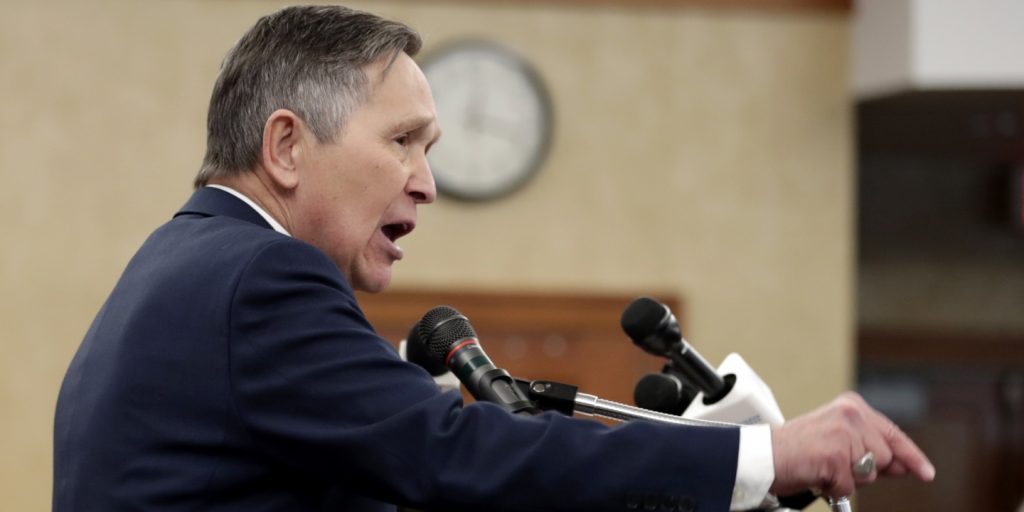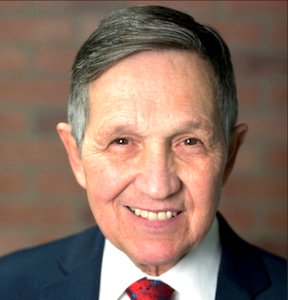
Events continue to unfold at a quickening pace. Facing an alarming escalation in tensions around the world, we asked Dennis Kucinich for his current thoughts.
We focus here on the realities of the international power struggle unfolding in real time, specifically addressing the role of the U.S. in the tensions and its capacity to reduce them. We are looking for paradigm-shift ideas for improving the prospects for peace. His responses below are exactly as he provided.
Here is what Mr. Kucinich had to say.
Q. We hear a lot of terms and acronyms bandied about. ‘Deep State’ … ‘MIC’ … ‘FIRE sector’ … ‘ruling elite’ … ‘oligarchy’ … ‘neocons’. Who actually defines and sets America’s geopolitical priorities and determines our foreign policy? Not “officially”. Not constitutionally. But de facto.
DK: Ideologues, the defense industry and associated contractors. US geopolitics is about imperialism. It is a for-profit business.
Q. We’ve had decades of international tensions. Recent developments have seen a sharp escalation in the potential for a major war. The U.S. apparently cannot be at peace. “Threats” against the homeland are allegedly increasing in number and severity. The trajectory of our relations with the rest of the world appears to be more confrontations, more enemies, more crises, more wars.
Is the world really that full of aggressors, bad actors, ruthless opponents? Or is there something in our own policies and attitudes toward other countries which put us at odds with them, thus making war inevitable and peace impossible?
DK: Yes, the world is a dangerous place, with dangerous actors. US interventions are often for reasons unrelated to the concerns of the “host” nation. They generally result in disaster for the local population and proliferate the potential of wider war.
Q. Our leaders relentlessly talk about our “national interests” and our “national security”, warning that both are under constant assault. Yet, we spend more than the next nine countries combined on our military. Why does such colossal spending never seem to be enough?
DK: Because war is a business with no accountability. The more that is spent on war, more needs to be spent and the more money the MIC makes.
Q. It’s evident that you, and the many individuals who follow you and support your work, believe that America’s direction in both the diplomatic sphere and in the current conflict zones represents exercise of government power gone awry. Can you paint for us in broad strokes the specific changes in our national priorities and policies you view as necessary for the U.S. to peacefully coexist with other nations, at the same time keeping us safe from malicious attacks on our security and rightful place in the world community?
DK: Close all foreign military bases. Reinstate all nuclear treaties. Abolish nuclear weapons. Join the biological weapons convention, the chemical weapons conventions, the landmine treaty, the small arms treaty and join the international criminal court, and sign the Rome convention. Begin turning swords into plowshares by redirecting money sent to the Pentagon for domestic priorities instead.
Q. The general public, especially when it’s aware of the self-sabotaging results of our current foreign policies and military posturing, clearly wants less war and militarism, preferring more peaceful alternatives on the world stage and greater concentration on solving the problems at home. As peace activists, we are thus more in line with the majority of citizens on issues of war and peace, than those currently in power.
What happens if we determine that those shaping current U.S. policy don’t care what the citizenry thinks, are simply not listening to us? What if we conclude that our Congress, for example, is completely deaf to the voice of the people? What do we do? What are our options then? What are the next concrete steps for political activists working toward a peaceful future?
DK: This is what elections are all about. War or peace needs be the defining issue in our national elections.
_________________________________________________________________________________________





